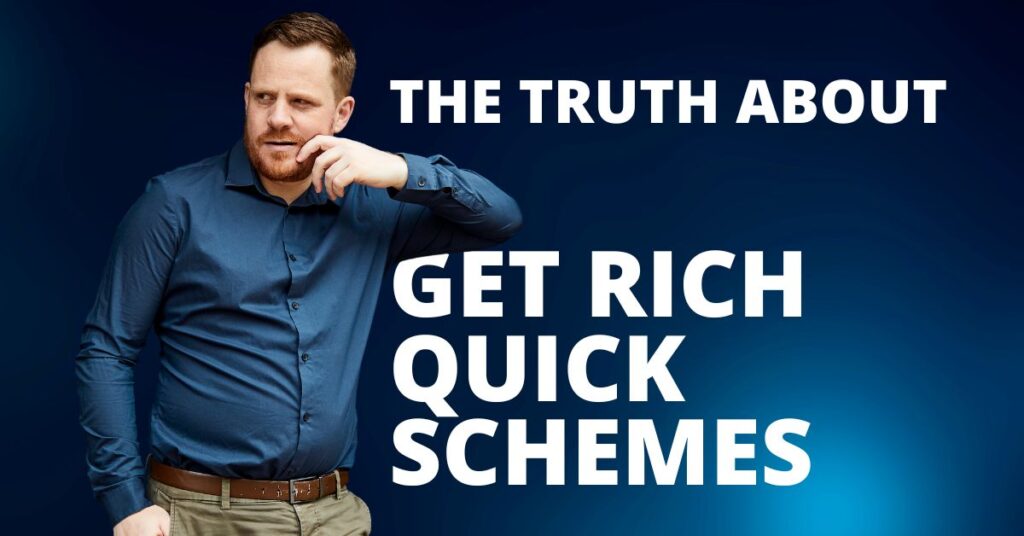Around six years ago, I was drawn to a Facebook Ads course promising quick revenue generation. The course claimed that for every pound spent on advertising, you could generate 5 to 7 pounds in return for selling online courses. However, after signing up for the course, watching all the videos, reading all the additional material and listing to all the people who had made it work, I still couldn’t, and my little bit of money dwindled away. This was, in fact, one of those ‘get rich quick schemes’ that lured people into the course with false hopes and half-truths, just with a flashy new title. For some, one of these get rich quick schemes could work, but for me and where I was in my online marketing career, it couldn’t. And taking into account the integrity I now pride myself b,y I’m glad it didn’t.
So, why not
See, what’s often omitted from such courses is the significant time investment required to see real results. Ok, sounds obvious; put in the effort! But the time and effort missing are not what I’m doing now as per the get rich quick scheme says, but the time it took before getting to this stage, the time needed to build up the amount of names, email addresses, and Facebook or Instagram followers to make this quick transition from running ads to making sales needs to work because no matter how strategic and well-crafted your advertising campaign, success can’t be guaranteed overnight.
What’s missing
These courses often draw on existing data and successful campaigns, creating an illusion of immediate results without providing insight into the extensive groundwork laid to achieve such success. They aren’t going to tell you that following this strategy will take 12-18 months because no one would buy it. They go for the low-hanging fruit, someone like me at the time desperate to turn my little cash into a multi-millionaire business.
The taglines matter
Many of these courses utilise platforms like YouTube and Instagram, promising quick fortunes with attractive taglines. They can demonstrate impressive figures, but those results usually stemmed from years spent building marketing data and targeted audiences. Often, they lure you in with free advice, only to hit you with high-ticket course fees once you’ve taken the bait.

But there’s always good in every bad.
Not everyone is like that; I recently stumbled upon a book called “From Nothing” by Ian Pribyl, a refreshing look at the affiliate marketing industry. In the book, Pribyl advises prospective affiliate marketers to prepare to commit at least 10 hours a week for a year before expecting any significant income. Unlike many books and how-to videos currently on the market, it’s a sobering yet realistic approach that sets the right expectations.
Gary is King
One of the other issues we have is free content. The bits and drapes that we can easily get caught up in. When we consider figures like Gary Vaynerchuk, who champions content creation as a primary strategy for success, it’s crucial to remember that persistence and patience are implicit in his advice. Content creation is not a quick path to riches. It involves continuously collecting data, testing, and adjusting your strategy to see meaningful results. But if we use his stories and reels as motivational hits without following fully following his content, it can be easy to get caught up with the feeling that content is king, and 30 posts within a week is all I need for success. By the way, Gary is King. Follow him if you’re not, And no, I don’t have a Gary-sized cutout that I worship daily, but it would be cool to have one.
It’s not my first fall for get rich quick schemes.
The above might sound forgivable, ok you fell for one of those crafty a get rich quick schemes; not so bad, I hear you say. But this isn’t the first time, as I mentioned in Episode One of my Podcast. I decided if I was going to start with a podcast, I would hit the ground hard. But in 2000ish, maybe 2002, I got caught up with a mass mail-out scheme, which was clearly labelled as a get-rich-quick scheme. But at the time, they weren’t shunned and, in fact, glorified.
How did it work?
So the idea was that I paid the five people listed in the letter £1, which I sent back in an envelope to the address given. I then brought a list of names and addresses (remember this was before GDPR), and I copied the letter I had explaining I could become rich, along with the next person and so on. The only change I needed to make was to remove the person in position 5, move everyone down one, and add my name to the top. I then photocopied this as many times as I had names, addresses, and, more importantly, stamps. So I drafted in a few friends, went to the workplace of one of the friend’s dads and photocopied the hell out of this sheet. I also set up a template the print all the names and addresses onto sticky labels, and we printed until we were out of ink.
I’m struggling to remember if it was a few hundred or a few thousand, as it was over 20 years ago.
What could go wrong?
Honestly, that day I started looking through the Car Mart magazine, picking out my new car. My 200 people (say 200, as I can’t remember) would send me £1 each. Then they where could do the same, and if they all sent it to £200 with my name now in position two, I would make £40,000 (200 x 200), and then they would send it out to 200 more people, which I think would be £40,000 x 200 for position 3, £8,000,000. Even with a dropout of people not doing it, I was sure to make a million pounds.
I waited
I waited, and waited, and waited! My friends thought I was made, but back then, loyalty was strong, and they backed my crazy idea anyway; And who was right? They where. I didn’t receive a single-pound coin.

So what have I learnt?
You need to spend time collecting relevant data, understanding your audience, and connecting with them genuinely. Being diligent and patient in this process will undoubtedly lead to better, more sustainable results. While there are “get rich quick” schemes that might work momentarily, they often come at the expense of others, compromising your values and potentially leading to short-lived success. You would need to spend your time going from one get-rich-quick scheme to another, hoping that one day, one of the get-rich-quick schemes will stick.
For me, you need to avoid the allure of quick-profit schemes and invest time into understanding your audience and products thoroughly; it’s all about taking the time to collect data. To have names, email addresses, phone numbers, and Linkedin Contacts that are all sources ethically. This approach might not promise instant results, but it ensures a sustainable income stream that will stand the test of time.
Contentious learning
Be prepared to invest time in continuous learning. Marketing is an ever-evolving field, with new technologies, platforms, and trends regularly emerging. Stay abreast of these changes and continually adapt your strategies to remain relevant. Though it’s based on Affiliate Marketing, Books like Ian Pribyl’s “From Nothing” provide an invaluable foundation, but it’s crucial to supplement this with your own research and learning. Do check out Gary Vee and one of my favourites Shaa Wasmund. Basically, if they tell you it’ll take longer than you are willing to try, they’re probably the ones you should listen to.
Don’t give up
Don’t be disheartened by the challenges you encounter along the way. They are a normal part of the journey towards successful marketing. Use these challenges as stepping stones towards your ultimate goal, learning from each setback and using the lessons learned to inform your future strategies, and when you want to give up because it’s not working, remember that it probably is. Fitness training takes more than a week. Hell, getting over a cold always takes longer than it says on the side of your cold and flu medication. Shit takes time.
So, stay away from anything that feels like ‘get rich quick schemes’, instead set your expectations right, be patient, work hard, provide value and let your integrity guide your decisions. Remember, though we need to earn enough to live and grow, it’s not the promise of quick wealth that defines success in your business but the impact you make and the value you provide.

